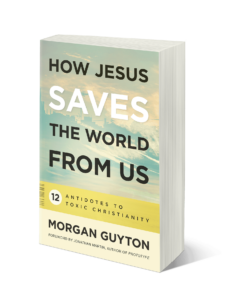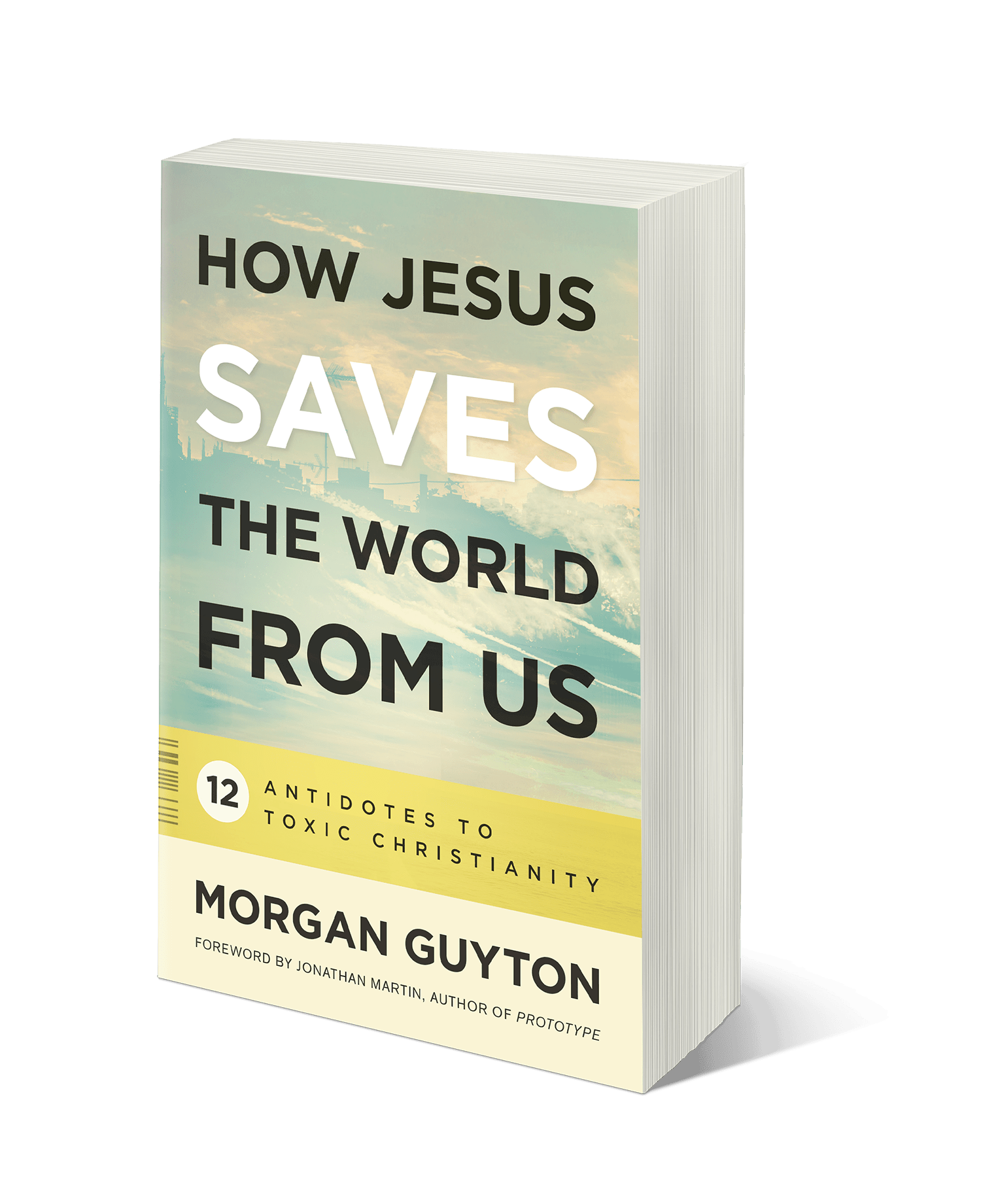In 2013, Morgan Guyton & I (Jared) had the chance to connect at Wild Goose Fest, where we were both presenting. He was hosting a dance party and I was speaking on creativity & faith. This past month Morgan published How Jesus Saves the World from Us: 12 Antidotes to Toxic Christianity so we sat down with him, metaphorically speaking, and asked him a few questions.
so we sat down with him, metaphorically speaking, and asked him a few questions.
Morgan’s blog is Mercy not Sacrifice. He and his wife Cheryl are co-directors of the NOLA Wesley United Methodist Campus Ministry.
1. Why did you write How Jesus Saves the World From Us? What was happening in your life that compelled you to write it?
Like many evangelicals who grew up during the eighties at the peak of our culture war, I’ve spent most of my adulthood trying to find my way to a less toxic version of Christianity. I grew up in a moderate Southern Baptist household during the fundamentalist takeover of our denomination. I used to think there were two kinds of Christians: those who were enthusiastic about the fact that God was going to torture billions of people forever in hell and those who were embarrassed and conflicted about it.
I’ve been writing this book in my head for a long time. Sometimes when I tell the story, it began when I was pushed out of the leadership of my InterVarsity chapter in college because I couldn’t accept biblical inerrancy. Other times, I start with the queer United Methodist congregation I discovered in my early twenties that introduced me to the contemplative spirituality and beautiful gospel of Henri Nouwen. I read some really helpful books along the way, one of which happened to be Pete Enns’s Incarnation and Inspiration my first year of seminary.
As I’ve journeyed into the world beyond evangelicalism, I’ve seen a whole lot of deconstruction and a whole lot of memoirs but I’ve been starving to find something that puts the theological pieces back together differently and more beautifully. So that’s the scavenger hunt I’ve been on for more than a decade.
2. The subtitle is 12 Antidotes Toxic Christianity. Which of the antidotes that you write about are you most excited to share?
“Worship not performance” is the first chapter and really the foundation for everything. If we don’t get worship right, our Christianity is going to be toxic. I really believe that the purpose of worshiping God is to lead us into authentic delight. It is a restoration of the wonder that we experience as children before we lose our innocence. God does not need our flattery, nor is God giving us a grade on how emphatically we say hallelujah. God just wants us to experience our belovedness and stop trying to prove ourselves worthy.
“Empty not clean” is my chapter about holiness. The purpose of spiritual discipline is not to prove our loyalty to God through staying clean; it’s to empty our hearts of idols so that we can be completely available to God’s love and perfectly hospitable to other people. Holiness is always for the sake of hospitality. This is the illustration of the Good Samaritan parable. The priest and the Levite were trying to stay clean; the Samaritan’s heart was empty enough to be moved with compassion.
“Poetry not math” is my chapter about the Bible. Unsurprisingly, it includes several references to Pete’s work. I recognize that there are many genres of literature represented in the Bible. Not all of it is poetry. But we need to read the Bible like we read a poem instead of the way we read a word problem in math class. The point is not to solve the Bible; the point is to be inspired by it.
“Outsiders not insiders” is my chapter about what the church should look like and what our priorities should be. We are called out of the world not in order to be a gated community of elite insiders but to walk with the world’s outsiders. When Jesus says to take up our crosses and follow him, he’s not telling us to find a set of moralistic “sacrifices” by which we can justify ourselves; he’s telling us to join those who are being crucified.
“Kingdom not stadium” is my chapter about evangelism. It seems like American evangelicalism is too much in the business of building triumphalist hype stadiums where our pyrotechnics and fog machines are the main thing God is doing in the world. An evangelism that is faithful to God’s kingdom recognizes that we don’t own that kingdom. We are simply pilgrims on a journey together. So evangelism is not about telling other people they need to come to my stadium and become my clone. It’s about sharing my journey and listening to others share their journey. If I’m actually a pilgrim, then I cannot evangelize without expecting to be evangelized.
3. As you researched and wrote the book, what was something that surprised you?
The title of the book came about very late in the process of writing it. Originally, this was very much a book about saving the world from “those” evangelicals. But the more I wrote, the more I realized that I exuded most of the qualities I was critiquing in others. I had to confess that I’m toxic and I need to be saved from myself. So over time, this became less of a manifesto against evangelicalism and more of a personal journey of spiritual formation. My hope is that people on every point on the theological spectrum would find things to be convicted, encouraged, and healed by.
4. Who are you trying to reach in this book?
My main audience are the Rachel Held Evans post-evangelicals. Those are the people who are most likely to do a lot of underlining and highlighting. But I’m really hoping to reach the Dones who have decided to leave Christianity altogether. I know everyone’s journey is unique. So it would be naïve and arrogant for me to think that my book could bring them back in the fold. I just want to offer a vision of healing and hope for people who have been hurt by toxic Christianity, however they choose to use these antidotes in their spiritual journey. I’m also hoping that moderate evangelicals would be willing to dialogue with these ideas for the sake of our mutual edification and detoxification.

